
- Share via
For Eva Marroquin, a regular day at work brings on a pounding headache, a racing heart and her body feeling like it’s on fire. As a construction site cleaner in Austin, Texas, Marroquin and other outdoor workers across the state regularly endure long workdays in triple-digit temperatures — the city is expected to see highs of 107 degrees in the next week. It’s grueling work that puts them at higher risk of heat exhaustion, heat rashes and even deadly cases of heatstroke.
“This can be fatal,” she says. “It feels like you’re choking on the heat. It’s almost like a fever — you feel it all over your body.”
Technically, Marroquin is one of the lucky ones. In a state that leads the nation in heat-related deaths on the job — the U.S. Bureau of Labor Statistics recorded 170 such deaths in 2020 — only two of its major cities, Dallas and Austin, have mandated water breaks for construction workers. In Dallas, the regulations came as a result of organizing efforts and protests after the death of 25-year-old Roendy Granillo in 2015 from heatstroke.
Marroquin says that even in cities like Austin where these regulations do exist, they are applied unevenly across work sites. Over the years, when other workers have mentioned to her that they aren’t given ten-minute breaks, she’s had to remind them it’s required by law. “Some bosses have almost never respected our rest times,” she says. “The truth is that it should probably be closer to twenty-minute breaks.”
The inclusion of a Colombian American drag queen has put the National Museum of the American Latino in jeopardy.
And while these protections may not be entirely sufficient, they’re now also under attack. In the midst of the state’s record-breaking heat wave, Gov. Greg Abbott signed House Bill 2127 into law. Known as the “Death Star” bill, HB 2127 will nullify local regulations like the existing water protections in Dallas and Austin, and prevent other cities from implementing similar protections in the future.
“When you have people entrusted by the public to protect them, like the governor, instead of protecting people, he’s taking workers’ rights away, that’s a major problem,” says Rep. Greg Casar of Austin.
Last week, Casar elevated the issue to the national level, leading a thirst strike on the steps of the U.S. Capitol in hopes of highlighting the dangers of HB 2127 and the need for heat protections on a federal level.
It was a full-circle moment for Casar, who was just 21 when he got his start organizing a thirst strike in 2010 with the Workers Defense Project. “I believe that we have to get creative,” Casar says. “We can’t do the same old, same old if we want to get worker protections passed. People have been talking for decades about this and it just hasn’t gotten done.”
Currently, the Occupational Safety and Health Administration has no “heat standard” mandating regular breaks for workers. And as the effects of climate change mean longer, more dangerous stretches of high temperatures, advocates like Christine Bolaños of the WDP argue that the lack of protections will only lead to more deaths for workers.
Last month, a San Antonio mother filed a lawsuit against B Comm Constructors after the death of her son, 24-year-old Gabriel Infante, who was exhibiting heatstroke symptoms while laying fiber optic cable in 100-degree weather.
“It’s a matter of life and death at this point,” Bolaños says. “It seems like every couple of weeks, we hear a new story of a construction worker dying in Texas. These are very real issues going on, and it just seems like our state leadership is kind of burying its head in the sand. That’s why we’re trying to do something about it at the federal level because we know that asking our state leaders for accountability just isn’t enough.”
The people of New Mexico were the first victims of the atomic bomb, the result of the Manhattan Project’s Trinity Test on July 16, 1945.
Bolaños also points out that outdoor workers often come from particularly vulnerable demographics, which impedes their ability to advocate for themselves. Six out of every ten construction workers are Latino, according to the U.S. Census Bureau. And roughly a quarter of construction workers in Texas are undocumented.
“Construction workers tend to be low-wage workers, oftentimes, Spanish speakers, or immigrants who are vulnerable to abuse in the workplace,” she says. “If a worker doesn’t speak English well enough to communicate with their supervisor that they need to take a break, then their supervisor may not be keen to give it to them in the first place. They have to advocate for themselves, and that’s why so many workers were so appreciative of these local ordinances — it added a layer of protection for them.”
Since the strike, there has been movement on the idea of federal regulations. President Biden recently announced that he would be asking the Department of Labor to issue a high heat hazard alert, the first to ever be issued in the country. Today, the WDP has joined with more than 100 other labor and community organizations demanding that Abbott reinstate heat protections statewide.
“Working should not be a death sentence,” Casar says. “Opponents might argue that the current system is working, but you just have to look at the gravestones to know that isn’t true.”
Marroquin, who joined Casar at the Capitol for the thirst strike last week, called out detractors with a simple message: “Those who are opposing these regulations, I would like for them to experience the heat, to go outside and work in the sun like we do,” she says. “Let’s see how long they can last.”
Cat Cardenas is a Latina writer and photographer based in Austin. Her work has appeared in Rolling Stone, New York Magazine, Harper’s Bazaar, GQ and other publications.
More to Read
The Latinx experience chronicled
Get the Latinx Files newsletter for stories that capture the multitudes within our communities.
You may occasionally receive promotional content from the Los Angeles Times.








